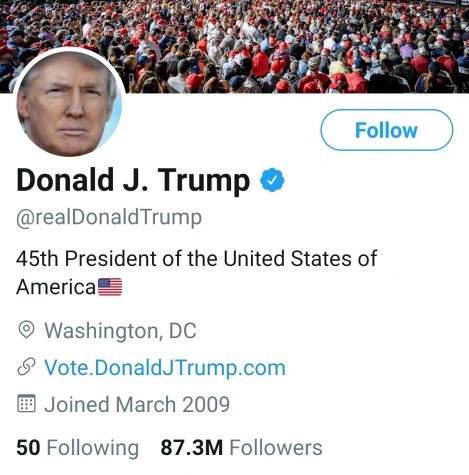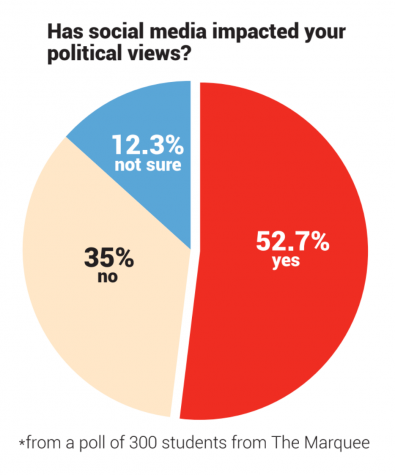Effect of social media
October 30, 2020
Social media has played a major role in getting teens involved in politics in recent years. Almost 53 percent said that social media has impacted their political views in some way. Junior Luke Dodson, who identifies as a leftist, believes that social media has helped students see the big picture when it comes to politics.
“I think it’s made political involvement much more accessible,” Dodson said. “It really lets us not just get a grasp for how other people identify politically, but also be introduced to new viewpoints.”
AP Government teacher Carey Petkoff believes that social media has helped many teens develop their political opinions in a way that wasn’t available to previous generations.

“I think it is a unique way for your generation to be able to sort of vocalize your thoughts and feelings about things,” Petkoff said. “Whereas in my generation, the internet existed, but social media wasn’t a big deal and so if you w
ere going to talk politics, then you had to have friends who wanted to talk with you, and that’s not always the case.”
Senior Tristan Fredrick, who identifies as a Conservative, said that he follows a lot of political-based accounts and discusses politics with others on social media, allowing him to consistently see political content in his feed.
“At least on social media and stuff, I was pretty active during 2016, but… I just feel like on social media, everyone shares their views now, and I think it’s good that there’s more political involvement,” Fredrick said. “I’m hoping that means there’s more young voter turnout.”
Social media usage in politics isn’t limited to teens. In recent years, politicians on both sides have been using social media to connect and interact with younger voters and supporters in a more casual setting. According to the Pew Research Center, politicians use Twitter twice as much and have three times as many followers in 2020 when compared to 2016.
This is especially true for President Donald Trump, who is known for using his Twitter account to openly share his opinion on controversial topics and political figures. He currently has over 87 million followers on the platform.
“You have all this information at your fingertips,” Petkoff said. “If you want to know what the president thinks about something, he’s constantly putting it out there. So I think it’s nice to be able to see what it is he’s thinking at any given moment.”
While social media has played a huge role in boosting teen interest in politics, it can also have a negative effect. Apps often suggest content based on a users’ interests, which can prevent users from being exposed to a wide variety of opinions. Junior Avery Hamilton, who identifies as a Conservative, also worries that false information can spread quickly on social media.
“I feel like people see stuff online and then they post out without really researching or thinking about what the actual context of the scenario was,” Hamilton said.

Senior Carson Fisher, who identifies as left-leaning, said that consistently seeing information on social media can persuade someone’s thinking without them realizing it. Fisher has noticed that if he gets too many TikTok videos promoting a political topic, he’ll sometimes begin to believe it, even if he does not agree with it.
“I find myself after a while believing stuff, or starting to believe stuff that I kind of snap out of and am like, ‘Wait, I know that’s not correct,’ Fisher said. “So I think it has almost a hypnotic effect without realizing it.”
Fredrick said that he is concerned that social media companies may ban people based on their political beliefs. One of his friends was banned on Twitter twice, the first time coming shortly after the 2016 election, and Fredrick believes it had to do with his Conservative content.
“I think it depends on what you’re associated with and the people you follow, but also, I think there’s a lot of tech censorship,” Fredrick said.
Petkoff said that social media has the potential to either educate teens about politics or make them resent it completely depending on how it is used.
“Sometimes it’s just too much and it’s really easy to turn it off and completely escape it,” Petkoff said. “Especially if you aren’t a regular news reader or watcher, it’s really easy to escape it and never know what’s going on. So I think it’s sort of either end of the spectrum.”